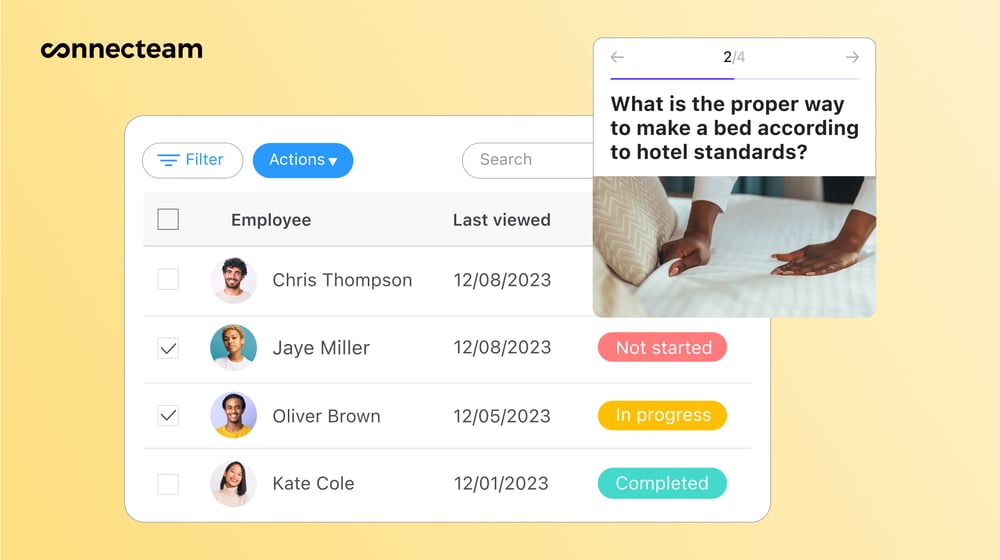Hotel management is an incredibly fast-paced and dynamic field. If you’re passionate about team collaboration and providing warm hospitality, this could be the industry for you. Check out the ins and outs of hotel management as well as our top tips for ensuring operations run smoothly.
Ever wonder what goes on behind the scenes at your favorite hotel? Hotel management is all about juggling guest needs, keeping up with travel trends, and making sure operations runs smoothly.
In this article, we’ll pull back the curtain on the world of hotel management, sharing the ins and outs and the challenges that come with making sure guests have a stay to remember.
What is Hotel Management?
Managing hotels effectively ensures the establishment’s economic success while providing exceptional guest experiences. Responsibilities include:
- Event management
- Overseeing front desk operations
- Creating employee schedules
- Ensuring smooth team communication
- Monitoring housekeeping
- Supervising food and beverage services
- Marketing and sales efforts to promote the establishment
- Financial oversight to maintain profitability
- Human resources management to recruit, train, and oversee staff
Hotel vs. Hospitality Management: What’s the Difference?
Hotel management and hospitality management are closely related but refer to different scopes of the service industry. Hotel management is specifically focused on the oversight and administration of hotel operations, encompassing areas such as front office operations, housekeeping, food and beverage services, and financial management within the hotel setting.
Hospitality management, on the other hand, has a broader scope, encompassing not only hotels but other sectors of the hospitality industry, including restaurants, event planning, cruise lines, and even food trucks.
While hotel management can be seen as a subset of hospitality management, the latter encompasses a wider range of establishments and services dedicated to ensuring guest satisfaction and memorable experiences in a number of settings.
7 Effective Hotel Management Tips
If you want to go into more detail about how to manage a hotel, check out our 7 expert tips:
Communicate effectively
Miscommunication in the workplace leads to mistakes, lack of oversight, and decreased team morale. In addition, a lack of team communication can prevent your staff from feeling connected and engaged at work.
As a hotel manager, you should create an environment of open communication. That way, managers can assign tasks, create and send schedules, solve problems, and answer questions. It will also allow employees to create more personal connections at work.
However, hotel staff work in different departments and during different shifts, so ensuring effective communication is difficult. They may not see or speak to each other in person regularly, and keeping everyone on the same page can be a challenge.
There are many ways to improve communication on your team. You can send newsletters, emails, and create group chats to align everyone. However, one of the best ways to ensure effective communication is by using an employee communication app, like Connecteam.

Tools like in-app chat, a company newsfeed for announcements and updates, task management tools, and employee scheduling features help managers stay in touch with their workers, and allow team members to chat openly with each other.
Did You Know?
According to Gallup, only 7% of U.S. workers strongly agree that communication is accurate, timely, and open where they work. By implementing a reliable employee communication system, you can drastically increase this number among your hotel staff.
Get started with Connecteam for free today!
Create standard operation procedures (SOPs)
Standard operating procedures (SOPs) describe each hotel employee’s role and task in detail. Creating clear SOPs is essential for hotel management because they establish a consistent set of processes and expectations, ensuring that every guest receives the best experience possible.
SOPs are also beneficial because they:
- Provide clear guidelines for staff and reduce ambiguity in their roles and responsibilities.
- Help ensure guest satisfaction by reducing inconsistencies, which can lead to negative online reviews and bad reputations.
- Facilitate smoother training processes for new employees by offering a definitive blueprint of how tasks should be executed.
- Allows for quicker problem-solving and conflict resolution by having established procedures in place.
This Might Interest You
Download our free templates to help streamline your daily workflows:
Create a structured onboarding and training program
A structured employee onboarding and training program is crucial because it ensures that new hires have all the relevant information they need to perform their jobs. It gives them time to integrate into the new company and gain the confidence to succeed.
As a result, you’ll have a more successful hotel that provides better customer service, increased employee retention rates, and higher profits. In fact, companies with formal onboarding programs see 50% better retention and 62% greater productivity among new hires.
When creating training programs, it’s important to provide general company information as well as personalized training materials for each individual role. Then, store all documents in a centralized knowledge base that employees can access from their phones. That way, they can complete training from anywhere and access important information as needed.
Pro Tip
Incorporate micolearning into training courses, a method that presents new topics in short modules in a variety of formats, like quizzes, videos, and slideshows. This method presents new information in bite-sized pieces so employees can more easily absorb the information.
Hire the right people
A strong team is your most important asset. The right employees will fit in with your hotel culture, work hard, be eager to learn, and provide warm hospitality to guests. While you may be eager to hire, especially during busy times like the holiday season, take your time interviewing to find the right staff–your hotel will run more efficiently with the right people working in it.
One way to better learn about your candidates is to ask behavioral questions during the interview process. Behavior questions help you understand how candidates respond to potentially difficult scenarios on the job.
For example, you could ask candidates interviewing for a front desk role how they previously responded when a guest was unhappy with their room designation and how they handled the situation.
These questions are a reliable indicator of future performance and help managers gauge candidates’ problem-solving abilities and interpersonal skills.
Keep up with trends
Your hotel needs to stay up to date with the latest industry trends to remain competitive and satisfy customer demand. This usually involves an adjustment to both operational and marketing strategies.
The development of artificial intelligence and technology, soaring energy costs as a result of inflation, and a growing concern for sustainability are just a few primary factors that have drastically affected how consumers make purchasing decisions.
For example, Amazon’s Alexa For Hospitality has been adopted by major hotel chains, including Marriott. Hotel guests can adjust their room temperature, book spa and restaurant reservations, order room service, and even check out with the device when connected to smart speakers in their rooms.
Create a positive company culture
When employees enjoy their work experience, they are more likely to work hard and stay with the company for longer. Creating a positive company culture starts at the top, and doing so falls on management.
There’s a wide range of strategies you can implement to create a positive culture in your hotel, including:
- Promoting work-life balance and prioritizing employee wellbeing
- Providing growth opportunities
- Having open feedback channels
- Celebrating diversity and inclusion
- Celebrating hard-working employees
- Addressing issues promptly
Use the right hotel management software
Thanks to digital apps and software, hotel managers don’t need to manage their teams with pen and paper anymore. Hotel management software is your secret weapon for directing your team and providing the guest hospitality.
Connecteam, for example, is an all-in-one employee management app that automates all aspects of team management, from scheduling to payroll. Your employees have direct access to the app from their phones, too, so they can clock in, view their schedules, and access all relevant information in one place.
Some of Connecteam’s key features include:
- Drag-and-drop job scheduler: Create customized schedules from scratch for all departments or use premade templates. Manage shift swaps, PTO, and availability all from one place.
- GPS-enabled time clock: Employees can clock in and out of their shifts from their phones, and geofencing technology ensures they only do so on-site. Their hours are automatically recorded onto employee time sheets, simplifying the payroll process.
- Onboarding and training tools: With Connecteam, you can create your own customized training courses for each role and upload the materials right to the app. Employees can then complete training from their phones, and even while on the go.
- Task management: Create shift-specific tasks and add them to the schedule so employees can view them while on the clock. You can add forms and checklists, too, and even monitor employee progress from the admin dashboard.
- Communication features: Make it easy for managers and employees to communicate with in-app chat and the company newsfeed. You can also upload important documents to the employee Knowledge Base for easy access.
- Rewards and recognition tools: Make your employees feel appreciated and recognized with digital badges. You can also reward them with points they can redeem for gift cards to their favorite retailers.
>>Get started with Connecteam for free today!<<

Hotel Management Jobs and Average Salaries
If you’re new to the industry, in the process of getting a hotel management degree, or are looking to change career paths, we’ve provided a list of the most common hotel management jobs and their average US salaries to give you an idea of your earning potential:
General manager
Role: Oversees all day to day operations, ensuring that the hotel meets its financial goals, maintains its reputation, and provides excellent guest service.
Average salary: $50,000 – $150,000+/year, depending on the size and prestige of the hotel.
Front office manager
Role: Manages the front desk team, handles guest complaints, oversees reservations, and ensures smooth check-in and check-out processes.
Average salary: $40,000 – $70,000/year
Reservations manager
Role: Oversees the reservations team, manages room inventory, and works closely with sales and front office teams.
Average salary: $35,000 – $60,00/year.
Housekeeping manager
Role: Supervises the housekeeping department, ensures rooms and public areas are clean, manages inventory of cleaning supplies, and handles guest requests related to housekeeping.
Average salary: $30,000 – $60,00/year
Food and beverage manager
Role: Oversees the hotel’s dining areas, bars, and kitchen operations, manages inventory, and ensures food safety standards are met.
Average Salary: $45,000 – $80,00/year
Sales and marketing manager
Role: Develops and implements marketing strategies and social media strategies to promote the hotel, attract guests, and increase revenue.
Average salary: $50,000 – $90,00/year.
Human resources manager
Role: Handles recruitment, training, employee relations, benefits, and other HR-related functions for hotel staff members.
Average salary: $50,000 – $85,00/year.
Revenue manager
Role: Analyzes booking trends, market conditions, and historical data to set room rates and maximize revenue.
Average salary: $50,000 – $90,00/year.
Event and conference manager
Role: Coordinates and manages events, conferences, and banquets held at the hotel, ensuring client satisfaction.
Average Salary: $40,000 – $75,00/year.
Maintenance manager
Role: Oversees the maintenance of the hotel’s physical infrastructure, ensuring all facilities are in good working condition.
Average salary: $45,000 – $80,00/year.
The Bottom Line On Hotel Management
Hotel management is a dynamic industry that requires a delicate balance between operational efficiency and guest satisfaction. As the hotel industry evolves, driven by technological advancements and changing guest expectations, hotel managers must embrace innovations while continuing to deliver excellent hospitality.
By investing in technology like an employee management app, hotel managers can ensure that teams remain aligned, remain competitive, and provide excellent guest experiences.



![image of [Free eBook] Building an Effective Internal Communication Strategy](https://connecteam.com/wp-content/uploads/2020/07/Scene-4-768x512.png)